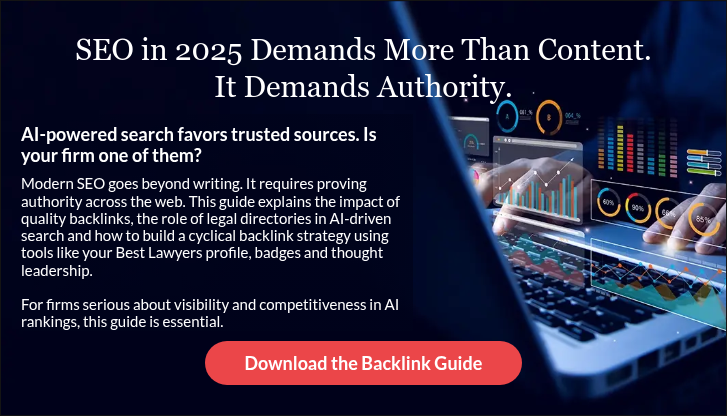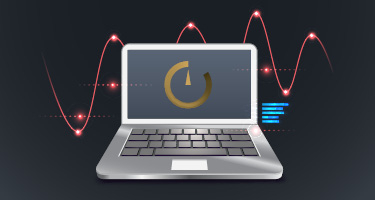As AI-generated content floods search results, law firms face a growing challenge: standing out with authentic signals. Google’s evolving algorithms, including the March 2024 core update, continue to prioritize expertise, trustworthiness and quality.
In this environment, link quality matters more than volume. Ethical, relevant backlinks remain vital for law firm SEO and long-term visibility.
Understanding Domain Authority in the Legal Domain
Before exploring how backlinks support law firm SEO, it helps to understand domain authority.
Created by Moz, domain authority is a third-party score that estimates how well a website may perform in search results. It draws on multiple signals, including how often reputable websites link to your pages.
For lawyers, domain authority offers a useful benchmark. Earning links from credible sources can improve that score and strengthen your online presence.
Types of Backlinks That Impact Law Firm SEO
Backlinks direct site visitors from one website to another and act as endorsements that boost your site’s credibility with search engines. For law firms, three main types affect SEO performance:
- Editorial backlinks: These links naturally emerge through high-quality content, mentions or guest articles. They reflect genuine authority and trust within the legal community.
- Directory backlinks: You earn these by listing your firm in trusted legal directories. They provide relevant referrals and confirm your verified online presence.
- Toxic backlinks: Those originate from low-quality sources such as link farms or paid link networks. They can damage your site’s reputation and lead to penalties from search engines.
Effective backlink strategies focus on earning editorial and directory backlinks while avoiding toxic links to maintain strong search rankings.
Why Backlinks Still Matter
Backlinks remain one of Google’s most influential ranking signals. They account for roughly 13 percent of overall ranking factors, reinforcing their long-term value in search performance.
Nearly all websites ranking in Google’s top 10 results have thousands of unique domains linking to them, underscoring the importance of diverse, high-quality link profiles.
When backlinks come from respected, relevant legal websites, they help demonstrate experience, expertise and trustworthiness which are core components of Google’s E-E-A-T framework. These references support both search visibility and client confidence.
Focus on earning high-authority backlinks for lawyers from credible sources within the legal community. This approach improves rankings, attracts qualified traffic and supports sustainable online growth.
Using AI Responsibly in Law Firm SEO Link Building
Law firms increasingly use AI tools to review backlink profiles, identify promising link opportunities and craft targeted outreach messages. These tools speed research and improve link-building efficiency.
Relying on AI-generated guest posts or link-building spam carries risks. Google’s guidelines classify manipulative link schemes as violations that can lead to penalties, including lower search rankings.
Google permits AI-generated content only when it meets quality standards and adds genuine value. Content or links created mainly to manipulate rankings can harm your site’s reputation. Responsible AI use in SEO focuses on quality and reliability.
Legal marketers should treat AI as a tool to assist, not replace, human judgment. Careful oversight keeps backlink strategies ethical, relevant and compliant with Google’s guidelines.
Where Can Law Firms Get High-Quality Backlinks?
Prioritize earning backlinks from relevant and recognized sources within the legal community. These methods support an effective backlink strategy for attorneys:
Bar Association profiles
Listing your firm on local, state or national bar websites adds credibility and provides reliable referral links.
Consider listing your firm on your state bar association’s website, such as the Alabama State Bar Association’s “Find a Lawyer” directory. This provides a high-quality backlink from a reputable legal source. This link could improve your SEO and help clients confirm your credentials.
Speaking engagements and CLE events
Participating in legal panels, webinars or continuing education events often include mentions or links to your site on event pages or promotional materials.
For instance, when you present at the American Academy of Matrimonial Lawyers’ CLE webinars as a family lawyer, their event page typically links to your website. These backlinks drive targeted traffic and signal your expertise and credibility to search engines.
Legal thought leadership platforms
Publishing in respected legal publications or practice-specific blogs earns editorial backlinks and highlights your expertise within the industry.
For example, if you’re an immigration lawyer, contribute to the American Immigration Lawyers Association’s (AILA) blog or resource pages. These trusted links highlight your knowledge and boost SEO where clients and peers seek information.
Trusted legal directories
Listing your firm in established directories does more than increase exposure. These platforms enhance your backlink profile. Best Lawyers, for example, offers publicly verifiable recognition and provides high-authority backlinks for lawyers and law firms alike.
Directories with national or global reach add extra value by expanding visibility beyond local markets.
Sponsorships and community involvement
Partnering with bar associations, nonprofits or legal education programs can lead to valuable backlinks. Sponsor acknowledgments, event listings or partner pages on respected legal sites often include links to your firm.
For example, if your firm sponsors a local legal aid clinic, the organization may list your support on its website with a direct backlink. This type of referral adds credibility and reinforces your role within the legal community.
Best Lawyers: The Platform for High-Authority Backlinks for Lawyers
Best Lawyers provides peer-reviewed recognition across more than 75 countries, offering law firms global visibility through a trusted, search-optimized platform. A public profile includes high-authority backlinks from a domain recognized by search engines, legal professionals and prospective clients.
Unlike general listing sites, Best Lawyers connects your name to a credible source known for selectivity and professional validation.
Common Pitfalls in Link Building for Law Firms
These common mistakes can weaken your visibility and damage your long-term SEO performance:
Paying for low-quality or spam links
Buying backlinks from questionable vendors, link farms or private blog networks can damage your website’s credibility. These links often lack relevance to your practice area, carry no editorial value and may violate Google’s spam policies. Search engines may reduce your discoverability and the long-term cost can outweigh any short-term gain.
Participating in irrelevant link exchanges
Exchanging links with unrelated websites or “mutual promotion” deals often provide no SEO value and are flagged by search engines. These arrangements are easy to flag as manipulative. Effective backlinks should come from sources connected to your legal focus and recognized within the profession.
Chasing domain authority without relevance
Pursuing backlinks from high-domain-authority websites without considering relevance or ethics can undermine your credibility. A link from a state bar association or a well-known network like Best Lawyers, holds more value than a link from an unrelated, high-traffic blog.
Neglecting toxic backlink monitoring
Harmful links can appear even if you’re not actively building backlinks. Spam domains, outdated websites or compromised pages may link to your site without permission. Regularly reviewing your backlink profile helps you catch and address these risks early by removing or disavowing harmful links that could hurt your visibility or reputation.
Relying on AI or automation without oversight
AI tools can effectively speed up content creation and outreach. However, generating guest posts or backlinks without proper quality control can result in low-value content.
Google evaluates backlinks based on their quality, editorial value and context, rather than on automation alone. Before incorporating automation into your process, consider pros and cons of using AI for link development to ensure your approach remains effective and compliant.
A strong example is Smithy AI, which balances human oversight with AI efficiency to help legal teams produce quality content while adhering to compliance standards.
The Role of AI in Modern Link Building
AI can support backlink strategy by improving research, outreach and targeting. But real value still depends on credibility. Search engines continue to increase scrutiny on link quality and automated shortcuts often fail to meet these standards.
Earning strong backlinks requires more than speed. It demands relevance, oversight and reputation within the legal field. The most effective links come from visibility built through expertise, not from automation alone.
The Power of Peer Recognition in Online Authority
Effective law firm SEO depends on ethical strategies, quality content and reputable backlinks. Building authority requires more than volume. It demands relevance and lasting recognition. Best Lawyers is more than a legal directory. It is a vetted legal network that boosts presence and credibility through search-authoritative listings.
For a deeper look at how backlinks, domain authority and AI-powered search affect your visibility, download our free guide, "The Modern Law Firm’s Guide to SEO, Backlinks and AI-Powered Search”.





























